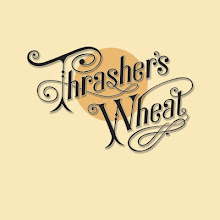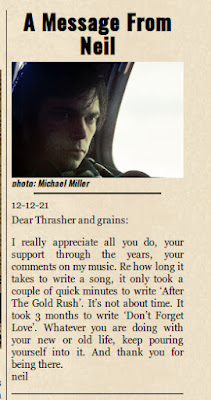Shelter Us From the Powder in the Finger: Analyzing Neil Young's Classic Song "Powderfinger"

We've always found the analysis of Neil Young lyrics to be quite fascinating.
And we're not the only ones. Of all the mail and comments that we receive here at Thrasher's Wheat, nothing compares with how frequently the topic of "Powderfinger" comes up. While many long time fans sort of roll their eyes at the subject, it seems that no other song so transfixes the more "casual" fan.
"Powderfinger" would seem to be near the very top of Neil Young's vast catalog as one of his most enduring and beloved songs.
From the indispensable Sugar Mountain, "Powderfinger" has been played 780 times, the 2nd most played song in concert.
The first performance was 1978-05-26, Late Show, The Boarding House, San Francisco, California, USA. The last performance was 2016-10-15, Empire Polo Club, Indio, California, USA. This is a span of nearly 40 years.
A quick recap. The definitive lyrics analysis of "Powderfinger" was done by Mark "Powderfinger" Klus way back in 1995 on the rust@fish server. Mark "Powderfinger"'s original analysis was quickly dissected and expanded.
But even today, the question of what does the song "Powderfinger" mean continues to be the source of endless theories.
"Powderfinger" was curiously omitted from his the 2011 album A Treasure since the song was a setlist regular during the 1984-1985 International Harvesters tours.
Also, check the hundreds of theories on 'Powderfinger' on the following TW threads:
- Shelter me from the Powder in the Finger - 2008
- "Powderfinger": What the Heck is that Song All About, Anyway?
- "Powderfinger": The International Harvesters Era Style
- Comments of the Moment: "Powderfinger" - What the Heck is that Song All About, Anyway?
Got a hunch on what "Powderfinger" is all about? Drop a comment below.
Labels: analysis, neil young, Powderfinger, song































 Human Highway
Human Highway

















 Concert Review of the Moment
Concert Review of the Moment





 This Land is My Land
This Land is My Land

 FREEDOM In A New Year
FREEDOM In A New Year









 *Thanks Neil!*
*Thanks Neil!*




![[EFC Blue Ribbon - Free Speech Online]](http://www.thrasherswheat.org/gifs/free-speech.gif)











 The Unbearable Lightness of Being Neil Young
The Unbearable Lightness of Being Neil Young Pardon My Heart
Pardon My Heart



 "We're The Ones
"We're The Ones  Thanks for Supporting Thrasher's Wheat!
Thanks for Supporting Thrasher's Wheat!




 This blog
This blog 
 (... he didn't kill himself either...)
#AaronDidntKillHimself
(... he didn't kill himself either...)
#AaronDidntKillHimself









































































 Neil Young's Moon Songs
Neil Young's Moon Songs




 Civic Duty Is Not Terrorism
Civic Duty Is Not Terrorism Orwell (and Grandpa) Was Right
Orwell (and Grandpa) Was Right


 What's So Funny About
What's So Funny About 



10 Comments:
So here are a few thoughts on Powderfinger below that we're seeding this thread with from earlier comments on TW...
From Shelter me from the Powder in the Finger:
One of Neil's most iconic and classic songs...I remember discussing this song with my college friends in 1980 - we'd listen to it over and over again (under the influence of who knows what!) and debate the story...it's fascinating to see the song still resonates as profoundly now as it did then...
Someone in another blog said something to the affect that 'Powderfinger' was a truly American song that touched on many themes without settling on one, and I tend to agree with that. I see the setting in the day - how else could 22 see a white boat coming up the river a mile away? Beyond that, I've always pictured a Southern scene, obviously a backwoods family earning what they saw to be an 'honest living' that wasn't perhaps legal...my wife's family were moonshiners in WV, and I can tell you they to this day believe they did NO wrong other than get caught!
As far as the specific scene, I see 22 as doing what he thinks is right regardless of knowing he is out-gunned and in a hopeless situation, that his actions of firing are his last (and only?) defiant act of protecting their lifestyle...as far as the white boat, in my mind it's the 'Government', the setting is the late 1800's, early 1900's...
I don't know if anyone will get the definitive answer as to the circumstance surrounding 'Powderfinger', but it's obviously a powerful song that, IMHO, is one of Neil's greatest, which is saying a lot considering his incredible breadth of work.
A comment by Greg M (A Friend Of Yours)
Well, after reading all 80 some comments from the link, and other interpretations over the years, I am not about to take a stab at a definitive take. I was fascinated though by some of the interpretations I never would have even begun to think of, e.g. suicide and nihilism.
Made me think.
I will say this, the name Emmy Lou tells me it is definitely the story of a white southerner. It’s an assumption, but I don’t see an Indian or black woman with the name Emmy Lou. By extension, Emmy Lou being taken by the river tells me the setting is river life somewhere in the south. Moonshiners, TVA resisters, people living off the grid, etc., or the nature and source of threat isn’t really relevant to me.
Ultimately, it’s the story of ill prepared and confused youth - could have been you or me or anyone, but for the grace of God, confronted and overcome by overwhelming forces and circumstances. Although I don’t think it’s what Neil intended. For me, 22 can also be seen as a metaphor for Man as yet still in its infancy, confronted with Life in all its complexity. The heartbreak and sadness is that the overmatched kid simply ended up on the losing end of an attempt at life that we all have to make sooner or later. It may come really early, big and fast, it may come in fits and starts, or it may just be a slow dribble over the course of a lifetime.
The question for me becomes: how have I, or will I face up to my own Powderfinger moment? 22 chose to raise the rifle to his eye instead of running, and died in regret. Was it nobleness in the act of death, or some form of foolishness? Who knows? Life, and the meaning of the life of another, like the song Powderfinger itself, can sometimes seem ambiguous. It all comes down to the individual. How are you going to make your stand? This makes me start to think about the advisability of the individual trying to take the world on by themselves, and all the alternatives to such an individual stance, but I don’t think this is what the song is about.
In the end, it seems 22 just didn’t feel like he had a lot of choice, and suffered the consequence.
Greg M (A Friend Of Yours)
From Matthew Lintzenich:
What HAVE we settled on with this? I mean, obviously there's a kid of barely 22 left alone to protect the ol' homestead, and here comes a white boat, with a red beacon, numbers on the side, a gun, and a man on the rail.
The kid obviously KNOWS that this is not good, remembers the words of his father, who told him to run when he see's red (to me, obviously this is the beacon he's referring to), decides to stand his ground anyway, uncertainly, and terrified, raises his father's rifle, and gets shot by someone on the boat.
His face splashing into the sky is the reflection of his face in the water as he's falling forward.
And he has a few last-second thoughts and regrets, and then that's it.
That's all apparently, to me, obviously correct, but if I recall the debate mostly centered on the SETTING, in terms of TIME AND PLACE, and that's where the confusion came in.
I believe that Neil made it kind of vague so it could be more universally interpreted, that is, you can put your own time and place into it so as to better identify, but I could be incorrect in that.
Neil has been vague about it, which seems to support that theory, but then again...
the names of the people (Emmy Lou and Big John) seem to indicate a very specific intent from Neil - that is, that the time and place are known to him, and are quite specific, but that, in typical Neil fashion, he leaves any direct references to that out, except for the names and description of the boat, so that we have to spend the next 30 years scratching our heads and arguing and debating about it.
heh heh heh.
So was there ever a conclusive agreement on the where/when of the song?
The song Powderfinger I feel is a metaphor of the price we humans pay when greed, power, and ego create the need to divide and conquer. Throughout human history there have been men in places of great power who feel the need to impose their need for more power by invading the innocent.
In the song, the young man has experienced the normal highs and lows of everyday life that we can all relate to, and then is faced by unknown invaders on his home shore. He is then forced to choose between freedom or oppression, and chooses to protect the only life he's ever known.
His humanity allows him a brief moment where he realizes his dilemma in the line, "shelter me from the powder and the finger", but his time of conflict between right or wrong is shortened by the fact he must act now because of forces bigger than himself. So he chooses to die a free man rather than live as a conquered man. The time and place could be anywhere or any time, but Neil chooses to create his personal vision of the location to tell his story.
These are just some of my thoughts on the lyrical content of this powerful song and I'm sure there is more to dissect, but for now I don't want to ramble on too long. The songs power is attributed to it's universal theme which anyone anywhere can relate to, and the dilemma forced on the young man's world.
This comment has been removed by the author.
You've got to remember how influenced by cinema Neil Young is. For many of his best songs, Neil isn't just songwriter; he's also director, stage manager. And you, as the listener, will often become the main character (when Neil sings "Daddy's rifle in my hand felt reassuring", then you are most likely imaging that rifle in your own hands, from a first-person point of view).
"Look out mama, there's a white boat coming up the river". "He came dancing across the water". "Once I thought I saw you in a crowded hazy bar". "Mindless drifter on the road". "The sun is setting on the long road home". "The wagons in the valley pulled up for the night". Stark opening lyrics written like stage directions, Neil writing the script, choosing the camera angles, the costumes, the background music.
Of course, Greendale is the most perfect and the most extended example of this cinematic approach. "Outside the jail window, a crow flew across the sky. Completely disappearing behind each bar, then a helicopter flew by". Perfect. And requiring no explanation.
In Shakey, Neil says Powderfinger is "just a scene, y'know?", and I think that's the best way to approach it. When I listen to it, I always see a miniature film in my head. Compare it to a movie like Resovoir Dogs; there's no set-in-stone point to it, it's a fly-on-the-wall record of an dramatic incident and the listener fills in the gaps, makes of it what she will. A scene constructed for it's own sake.
Nowadays, Powderfinger is one of those songs that is always solid but rarely exciting. Crazy Horse are the only band who routinely perform it wth the required hard-rock edge. Definitive Poncho, Talbot and Molina. Almost all non-Horse versions are underpowered and lack the required levels of drama and suspense.
For a particularly thrilling listen, I'll point you towards two live takes recorded days apart in 1991. Version one is from Maryland 27th February 1991 (sensibly included on the Weld CD), and version two is from Atlanta 3rd March 1991. Always solidly performed, taking the song up a level relies on the eloquence and soaring beauty of Neil's guitar playing, and in that respect these two versions are hard to beat.
Scotsman.
Has anyone every asked Neil Young what it's about and did he explain?
I think Powderfinger was left off of A Treasure simply because the International Harvesters could not capture the song in all of its essence. As an aside, count me as one who agrees with Neil's decision to leave Cinnamon Girl off of Live At Fillmore East. Its just not very good. Neither are the versions of PF I've heard (and seen performed live) with the IH.
His best song and definitely the one I sing in the shower most
Post a Comment
<< Home